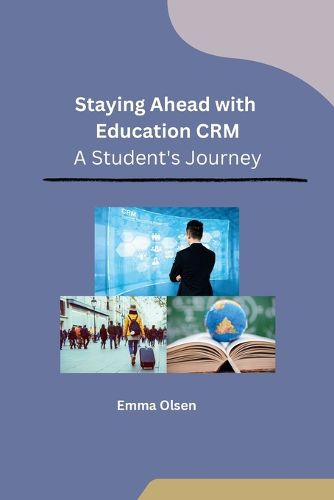Readings Newsletter
Become a Readings Member to make your shopping experience even easier.
Sign in or sign up for free!
You’re not far away from qualifying for FREE standard shipping within Australia
You’ve qualified for FREE standard shipping within Australia
The cart is loading…






This title is printed to order. This book may have been self-published. If so, we cannot guarantee the quality of the content. In the main most books will have gone through the editing process however some may not. We therefore suggest that you be aware of this before ordering this book. If in doubt check either the author or publisher’s details as we are unable to accept any returns unless they are faulty. Please contact us if you have any questions.
In today's digital era, the role of technology in education has become increasingly significant. One of the most powerful tools that educational institutions can leverage is Customer Relationship Management (CRM) systems. This subchapter titled "Understanding CRM in Education" aims to enlighten students on the importance and benefits of CRM in the context of education.
Customer Relationship Management, commonly referred to as CRM, is a strategy that educational institutions adopt to effectively manage their interactions with students and potential students throughout their educational journey. CRM systems enable educational institutions to streamline their processes, enhance communication, and ultimately provide a better experience for all stakeholders involved.
For students, CRM in education offers numerous advantages and opportunities. Firstly, CRM systems facilitate personalized communication between students and educational institutions. By capturing and analyzing data such as academic performance, course preferences, and extracurricular interests, CRMs enable institutions to tailor their communication and support to individual students. This personalized approach ensures that students receive relevant information, guidance, and support, leading to increased student satisfaction and engagement.
Furthermore, CRM systems also provide students with a centralized platform to access various resources and services offered by educational institutions. From course registration and timetable management to career counseling and academic support, CRM systems act as a one-stop-shop for students, simplifying their educational journey and saving valuable time.
Moreover, CRM in education can also assist students in making informed decisions about their academic and career paths. By analyzing data on student performance, interests, and goals, educational institutions can provide personalized recommendations for courses, majors, and career opportunities. This empowers students to make well-informed decisions aligned with their aspirations and strengths.
$9.00 standard shipping within Australia
FREE standard shipping within Australia for orders over $100.00
Express & International shipping calculated at checkout
This title is printed to order. This book may have been self-published. If so, we cannot guarantee the quality of the content. In the main most books will have gone through the editing process however some may not. We therefore suggest that you be aware of this before ordering this book. If in doubt check either the author or publisher’s details as we are unable to accept any returns unless they are faulty. Please contact us if you have any questions.
In today's digital era, the role of technology in education has become increasingly significant. One of the most powerful tools that educational institutions can leverage is Customer Relationship Management (CRM) systems. This subchapter titled "Understanding CRM in Education" aims to enlighten students on the importance and benefits of CRM in the context of education.
Customer Relationship Management, commonly referred to as CRM, is a strategy that educational institutions adopt to effectively manage their interactions with students and potential students throughout their educational journey. CRM systems enable educational institutions to streamline their processes, enhance communication, and ultimately provide a better experience for all stakeholders involved.
For students, CRM in education offers numerous advantages and opportunities. Firstly, CRM systems facilitate personalized communication between students and educational institutions. By capturing and analyzing data such as academic performance, course preferences, and extracurricular interests, CRMs enable institutions to tailor their communication and support to individual students. This personalized approach ensures that students receive relevant information, guidance, and support, leading to increased student satisfaction and engagement.
Furthermore, CRM systems also provide students with a centralized platform to access various resources and services offered by educational institutions. From course registration and timetable management to career counseling and academic support, CRM systems act as a one-stop-shop for students, simplifying their educational journey and saving valuable time.
Moreover, CRM in education can also assist students in making informed decisions about their academic and career paths. By analyzing data on student performance, interests, and goals, educational institutions can provide personalized recommendations for courses, majors, and career opportunities. This empowers students to make well-informed decisions aligned with their aspirations and strengths.